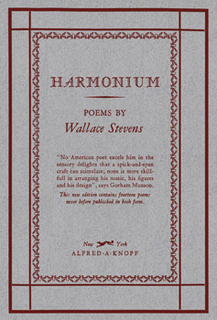Related Research Articles

Wallace Stevens was an American modernist poet. He was born in Reading, Pennsylvania, educated at Harvard and then New York Law School, and spent most of his life working as an executive for an insurance company in Hartford, Connecticut. He won the Pulitzer Prize for Poetry for his Collected Poems in 1955.

Ella Wheeler Wilcox was an American author and poet. Her works include Poems of Passion and Solitude, which contains the lines "Laugh, and the world laughs with you; weep, and you weep alone." Her autobiography, The Worlds and I, was published in 1918, a year before her death.
Intertextuality is the shaping of a text's meaning by another text. It is the interconnection between similar or related works of literature that reflect and influence an audience's interpretation of the text. Intertextuality is the relation between texts that are inflicted by means of quotations and allusion. Intertextual figures include allusion, quotation, calque, plagiarism, translation, pastiche and parody. It is a literary device that creates an 'interrelationship between texts' and generates related understanding in separate works. These references are made to influence the reader and add layers of depth to a text, based on the readers' prior knowledge and understanding. The structure of intertextuality in turn depends on the structure of influence. It is also a literary discourse strategy utilised by writers in novels, poetry, theatre and even in non-written texts. Examples of intertextuality are an author's borrowing and transforming a prior text, and a reader's referencing of one text in reading another.

Harmonium is a book of poetry by American poet Wallace Stevens. His first book at the age of forty-four, it was published in 1923 by Knopf in an edition of 1500 copies. This collection comprises 85 poems, ranging in length from just a few lines to several hundred. Harmonium was reissued in 1931 with three poems omitted and fourteen new poems added.

Justice is one of the four cardinal virtues in classical European philosophy and Roman Catholicism. It is the moderation or mean between selfishness and selflessness – between having more and having less than one's fair share.
"The Emperor of Ice-Cream" is a poem from Wallace Stevens's first collection of poetry, Harmonium. It was first published in 1922, and is in the public domain. Stevens' biographer, Paul Mariani, identifies the poem as one of Stevens' personal favorites from the Harmonium collection. The poem "wears a deliberately commonplace costume", he wrote in a letter, "and yet seems to me to contain something of the essential gaudiness of poetry; that is the reason why I like it".
"Peter Quince at the Clavier" is a poem from Wallace Stevens's first book of poetry, Harmonium. The poem was first published in 1915 in the "little magazine" Others: A Magazine of the New Verse, edited by Alfred Kreymborg.
"The Snow Man" is a poem from Wallace Stevens's first book of poetry, Harmonium, first published in the October 1921 issue of the journal Poetry.
Amor fati is a Latin phrase that may be translated as "love of fate" or "love of one's fate". It is used to describe an attitude in which one sees everything that happens in one's life, including suffering and loss, as good or, at the very least, necessary.
"Ploughing on Sunday" is a poem from Wallace Stevens's first book of poetry, Harmonium (1923). First published in 1919, it is now in the public domain.
"The Doctor of Geneva" is a poem from Wallace Stevens's first book of poetry, Harmonium (1923). The poem was first published in 1921, so it is free of copyright.
"Invective Against Swans" is a poem by Wallace Stevens from his first book of poetry, Harmonium (1923).
"Anecdote of Men by the Thousand" is a poem from Wallace Stevens's first book of poetry, Harmonium (1923). It was first published prior to 1923 and is therefore in the public domain, according to Librivox.
"The Apostrophe to Vincentine" is a poem from Wallace Stevens's first book of poetry, Harmonium (1923). It was first published before 1923 and is therefore in the public domain according to Librivox.
"Of the Manner of Addressing Clouds" is a poem from Wallace Stevens's first book of poetry, Harmonium (1923). It was first published in 1921 according to Librivox and is therefore in the public domain.
"Of the Surface of Things" is a poem from Wallace Stevens's first book of poetry, Harmonium (1923). It was first published in 1919, so it is in the public domain.
"Tea at the Palaz of Hoon" is a poem from Wallace Stevens's first book of poetry, Harmonium. It was first published in 1921, so it is in the public domain.
"Bantams in Pine-Woods" is a poem from Wallace Stevens's first book of poetry, Harmonium. It was first published in 1922 in the poetry journal Dial, along with five other poems, all under the title "Revue." It is in the public domain.
"Anecdote of the Jar" is a poem from Wallace Stevens's first book of poetry, Harmonium. First published in 1919, it is in the public domain.
"Palace of the Babies" is a poem from Wallace Stevens's first book of poetry, Harmonium. It was first published in 1916 and is therefore in the public domain.
References
- Leggett, B.J. Early Stevens: The Nietzchean Intertext. 1982: Duke UP.
- Nicholson, Mervyn. "Reading Stevens' Riddles." College English, Vol. 50, No. 1. (Jan., 1988), pp. 13–31.
- Peterson, Margaret. Wallace Stevens and the idealist tradition. 1983: UMI Research Press